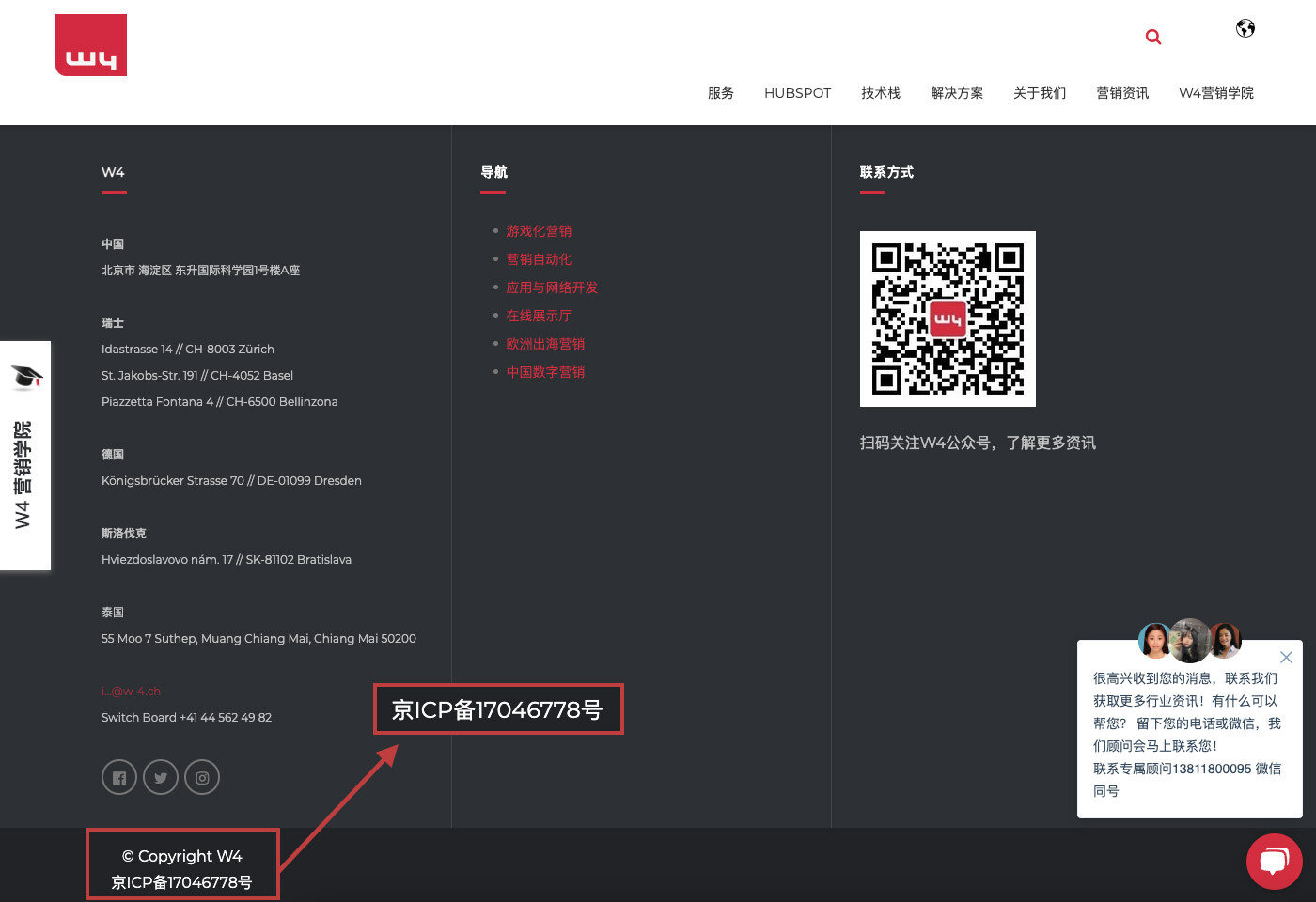An Internet Content Provider (ICP) License is a mandatory regulatory permit issued by the Chinese government, essential for legally operating a website hosted in China. Without obtaining the appropriate ICP license or completing ICP registration, hosting a website within China's jurisdiction is prohibited. This regulatory framework is designed to ensure compliance with Chinese internet laws and regulations, maintaining oversight and control over the content accessible within the country.
There are two primary types of ICP licenses:
-
ICP Registration or Filing: This type of license is designated for non-commercial websites. These sites typically provide static content, such as informational pages, personal blogs, and non-profit organizational websites. An ICP Registration ensures that these sites are legally recognized and permitted to operate within China.
-
ICP License: This more comprehensive license is necessary for websites that conduct commercial activities. It covers a broad range of online operations, including e-commerce platforms, online advertising services, and websites offering paid services. Obtaining an ICP License involves a more stringent application process due to the commercial nature of the activities, ensuring that the site adheres to all relevant laws and regulations governing business operations in the digital space in China.
Acquiring the correct type of ICP license is crucial for any entity looking to establish an online presence within China, aligning their operations with the regulatory requirements and maintaining legal status in one of the world's largest internet markets.
The Ministry of Industry and Information Technology (MIIT) or its local branches are the only institutions authorized to issue ICP licenses. There are no private companies or intermediaries with the legal authority to grant these licenses. This centralized control ensures that all websites comply with the rigorous standards set by the Chinese government.
Furthermore, navigating the application process for an ICP license can be intricate and challenging, especially for foreign entities unfamiliar with local regulations and requirements.
Acquiring an ICP number typically requires around 20 business days following the submission of documents to a hosting provider. If the documents pass the provider's initial review, they are then sent to the MIIT for further examination. Should the documents be rejected at any point, the applicant must provide additional documentation.
Agencies such as W4 can assist with this complex process. Our China-based team provides detailed guidance on the documentation needed, helps with translating and submitting necessary forms, and ensures that all regulatory prerequisites are met. Their expertise can significantly streamline the application process, reduce the likelihood of errors, and increase the chances of obtaining the license in a timely manner.
ICP License Requirements: Who Needs an ICP License?
To legally host and operate a website in China, any company or individual must obtain an ICP license if their website publishes or hosts content that falls into one or more of the following categories:
E-commerce
Websites that sell goods or services online must secure an ICP license. This includes online retail stores, marketplaces, and any platform facilitating the exchange of products or services for payment. The license ensures these commercial activities adhere to Chinese regulations, providing a legal framework for transactions and consumer protection.
Online Advertising
Websites that offer advertising services for products or services are also required to have an ICP license. This category encompasses platforms that host banner ads, sponsored content, and other forms of digital advertising. The license ensures that advertising practices comply with national standards and prevent the dissemination of prohibited or misleading advertisements.
Social Media
Websites providing users with the ability to connect, share, and interact with each other fall under this category. Social media platforms, including social networking sites, microblogging services, and other interactive communication tools, must have an ICP license. This regulation helps monitor and manage the vast amounts of user-generated content shared on these platforms.
WeChat H5 Pages and Mini Programs
WeChat H5 pages and Mini Programs, widely used within the WeChat ecosystem for various interactive and promotional purposes, also fall under the social media category. These H5 pages and Mini Programs function as mini-websites or applications within WeChat, allowing businesses and individuals to provide content, interact with users, and offer services directly within the app.
Both WeChat H5 pages and Mini Programs, especially those used for commercial purposes or involving user-generated content, require an ICP license to operate legally within China. This ensures compliance with Chinese internet regulations and maintains the standards of content oversight and legal accountability necessary for social media platforms.
Forums and Discussion Platforms
Websites facilitating user discussions, comments, and message exchanges must obtain an ICP license. This includes forums, bulletin boards, and any site where users can post and respond to messages. The license helps ensure these platforms are used responsibly and do not host illegal or harmful content.
User-Generated Content (UGC) Websites
Websites that allow users to create and publish their own content, such as photos, videos, or text, also require an ICP license. This category includes video-sharing sites, blogging platforms, and other content creation services. The license ensures that user-generated content is monitored and complies with Chinese content regulations, preventing the spread of unlawful or inappropriate material.

ICP License or ICP Registration / Filing?
Determining whether you need an ICP License or just an ICP Registration/ Filing depends primarily on the nature of your website and the activities it supports. Here's a more detailed explanation of the differences and the factors to consider:
ICP Registration / Filing
Intended for Non-Commercial Websites:
ICP Registrations are designed for websites that provide non-commercial content. This includes personal blogs, informational sites, educational resources, and non-profit organizational pages. These websites do not engage in any form of business transaction, e-commerce, or revenue-generating activities.
The approval process for an ICP Registration is generally more straightforward and quicker compared to that of a commercial ICP license. The requirements are less complex since non-commercial sites do not pose the same level of regulatory concerns as commercial sites.
The documentation and compliance requirements for an ICP Registration are less demanding. Applicants typically need to provide basic information about the website, its purpose, and the individual or organization behind it.
ICP License
Required for Commercial Websites:
An ICP License is mandatory for websites that engage in commercial activities. This includes e-commerce platforms, online advertising services, social media sites with monetization features, and any site offering paid services. Websites that facilitate financial transactions, host advertisements, or sell products/services fall under this category.
The approval process for an ICP License is more rigorous. It involves a thorough review to ensure compliance with commercial regulations and standards. The process can take longer due to the need for detailed scrutiny of the business model, financial practices, and content management systems.
Obtaining an ICP License requires meeting more stringent criteria. Applicants must submit comprehensive documentation, including business licenses, proof of legal presence in China, detailed descriptions of the commercial activities, security measures for user data, and more. This ensures that commercial websites operate transparently and within the bounds of Chinese laws and regulations.
The type of ICP permit you need—whether an ICP Registration or an ICP License—depends on the nature of your website's activities. Non-commercial websites can apply for a simpler and faster ICP Registration, while commercial websites must go through the more rigorous process of obtaining an ICP License. Ensuring you have the appropriate permit is crucial for legal operation and compliance within China's internet regulatory framework.
What Benefits does an ICP License Bring to Chinese Websites?
Obtaining an ICP license for your website in China offers numerous benefits that go beyond mere regulatory compliance. Here are the key advantages:
1. Legality & Compliance
- Mandatory Requirement: An ICP license is legally required to operate any website offering public content within China. Websites without this license can be suspended or blocked by Chinese authorities, making it impossible to maintain a stable online presence.
- Regulatory Compliance: Holding an ICP license indicates that your website complies with Chinese internet regulations. This compliance is critical for ensuring uninterrupted service and avoiding legal complications.
- Business Opportunities: Compliance with local regulations can facilitate partnerships with Chinese businesses, as it reassures potential partners of your commitment to operating within the legal framework.
2. Credibility & Trust
- Legitimacy: An ICP license serves as a mark of legitimacy and trustworthiness, signaling to users that your website is recognized and approved by Chinese authorities.
- Search Engine Ranking: Websites with an ICP license are often ranked higher in Chinese search engines like Baidu. This improved visibility can lead to greater traffic and better engagement with your target audience.
- Perception: Users are more likely to trust and engage with a website that holds an ICP license, as unlicensed websites are typically viewed as foreign and less reliable.
3. Access to Certain Services
- Cloud Services: An ICP license allows you to access Chinese cloud services, which are optimized for the local infrastructure and can offer better performance and reliability.
- Payment Processing: Licensed websites can integrate with local payment processing services like WeChat Pay, enabling smooth and efficient transactions for e-commerce and other commercial activities. This access is crucial for conducting business within China’s robust digital economy.
- Additional Resources: Licensed websites may also gain access to other resources and services that are restricted to compliant entities, such as certain advertising platforms and business networks.
4. Loading Speed and Accessibility
- Improved Performance: Hosting your website within China, as required for obtaining an ICP license, can significantly enhance the loading speed and overall performance of your site. This improvement is due to better integration with the local internet infrastructure and reduced latency.
- High Accessibility: Ensuring your website is accessible and fast-loading is crucial for retaining users and providing a positive user experience. Websites without an ICP license often suffer from slower loading times and higher rates of downtime, which can deter visitors and impact your business negatively.
- User Experience: A faster, more reliable website enhances user satisfaction and engagement, which is critical for achieving business objectives and maintaining a competitive edge in the market.
Consequences of Operating a Website in China Without an ICP License
The consequences of operating a website in China without an ICP license are severe and multifaceted. Website blocking, substantial fines, and the potential revocation of your business license can cripple your operations and significantly harm your business reputation. Ensuring compliance by obtaining the necessary ICP license is crucial for maintaining a stable, legal, and thriving presence in the Chinese market. Here are the potential consequences:
1. Website Blocking
- Immediate Blocking: Chinese authorities have the power to block access to websites that do not have an ICP license. This means that Internet users in China will be unable to access your website, effectively cutting off your presence in the Chinese market.
- Search Engine Delisting: Without an ICP license, your website may be delisted from Chinese search engines like Baidu. This further reduces visibility and makes it difficult for users to find your site.
- Service Interruptions: Even if your site is temporarily accessible, the lack of an ICP license can lead to intermittent service interruptions, frustrating users and damaging your brand’s credibility.
2. Fines
- Financial Penalties: Operating without an ICP license can result in substantial fines. These penalties are imposed to ensure compliance with local regulations and can vary depending on the severity and duration of the non-compliance.
- Escalating Costs: The longer you operate without a license, the higher the fines can become. This can lead to escalating costs that drain financial resources and hinder your ability to invest in other areas of your business.
- Enforcement Actions: Beyond fines, authorities may take additional enforcement actions, such as freezing assets or restricting other business activities until compliance is achieved.
3. Revocation of Business License
- Serious Infractions: In cases of serious or repeated infractions, the consequences can extend beyond financial penalties and website blocking. Authorities have the power to revoke your business license, effectively shutting down your operations in China.
- Loss of Market Access: Losing your business license means losing the ability to legally operate in the Chinese market. This not only impacts your current business activities but also tarnishes your reputation, making it difficult to re-enter the market in the future.
- Legal Proceedings: Revocation of a business license can lead to legal proceedings, including lawsuits and other legal actions from both the government and potentially from business partners or clients affected by your non-compliance.
How to Get an ICP License in 5 Easy Steps

1. Find a Local Hosting Provider
To obtain an ICP license, your website must be hosted in China. You don't need to travel to China to find a reliable hosting provider; we can assist you in hosting your website within China, ensuring it meets the necessary requirements.
2. Prepare the Required Documents
The specific documents required can vary by region, but generally, you will need:
- Your business license
- The ID card of the company’s legal representative
- Details of the website administrator
- Website or hosting details
3. Submit the Application
Once your application is complete, submit it along with the required documents to the Ministry of Industry and Information Technology (MIIT) or its local branch.
4. Wait for Approval
The approval process can take several weeks, so it’s important to plan ahead and apply for your ICP license early.
5. Integrate the License Number and Register with the Public Security Bureau (PSB)
After receiving your ICP license, follow these steps:
- Display the License Number: Place the ICP license number visibly in the footer of your website.
- Link to MIIT: Include a link to the MIIT website in the footer.
- Specify the License Type: Clearly state the type of license and the services for which the license was granted.
- Register with the PSB: If you have a commercial license, your website exceeds a certain number of monthly visitors, or you operate in a specific industry, you must register with the Public Security Bureau (PSB) within 30 days of launching your website. Failure to display the license or register with the PSB can result in license revocation, fines, and other penalties.
Challenges Associated with Obtaining an ICP License
Securing an ICP license in China involves navigating several bureaucratic challenges:
Language Barriers
- Communication: All interactions with Chinese authorities are typically conducted in Chinese, posing a significant challenge for companies without Chinese-speaking staff. This language barrier can complicate understanding requirements, completing forms, and following up on the application status.
Complicated Application Processes
- Complexity and Time-Consumption: The application process for an ICP license is intricate and can be time-consuming. It involves gathering various documents, ensuring they meet regional specifications, and accurately completing detailed forms, which can be overwhelming without prior experience.
Constantly Changing Regulations
- Regulatory Updates: China's internet content regulations are frequently updated. Companies must stay informed about these changes and ensure their websites comply with the latest standards. Failure to adapt to new regulations can result in delays or denial of the license.
W4: Your Reliable Partner for All Your China Marketing Endeavour
At W4, we specialize in managing the complex ICP license application process for you. Our on-site experts are well-versed in the requirements and procedures, ensuring that your application is complete and compliant. With our experience and attention to detail, we help streamline the process, allowing you to focus on your core business activities while we handle the bureaucratic hurdles. Let us be your trusted partner in navigating the Chinese market efficiently and effectively.











